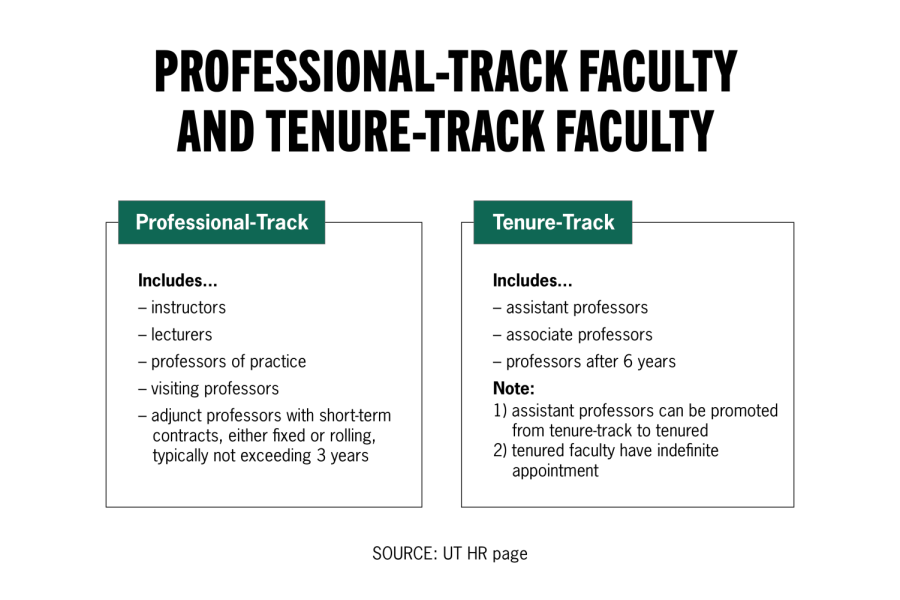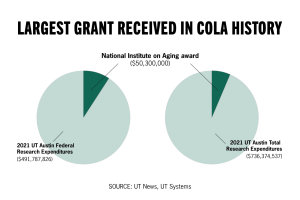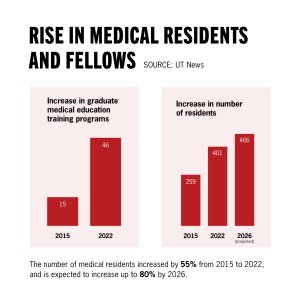Professional-track faculty discuss concerns about contracts, promotion
October 13, 2022
Stephanie Holmsten said when she started teaching at UT as a professional-track faculty member in 2012, she didn’t feel fully supported by administration. Since then, the University’s increased focus on professional-track faculty in recent years has made Holmsten feel like she belongs.
“Ten years ago, sometimes people would ask, ‘So, when are you going on the job market?’” said Holmsten, an associate professor of instruction. “I feel in more recent years that the University has made a commitment to me.”
At the Sept. 19 Faculty Council meeting, Sharon Wood, executive vice president and provost of the University, addressed professional-track faculty concerns about obtaining longer contracts and pay raises attached to promotion. About 50% of University faculty is on the professional-track and typically focus on teaching and classroom innovation, said council chair Jen Moon. Instead of aiming to receive tenure, they work on contracts ranging from one to three years.
Some efforts to improve support include launching a Professional Development Award of $10,000 for promoted professional-track faculty this semester. The provost’s office also plans to pilot mentoring and community-building opportunities for professional-track faculty, Kathleen Harrison, assistant director for University marketing and communications, said in an email.
“They teach the majority of undergraduates,” professor of instruction Moon said. “It’s really important for me that we’re hiring the best people, that we’re providing professional development, that we’re providing a career path.”
Antonia Chimonidou, associate professor of practice, said the University could improve guidance for career advancement. She said she did not know promotion was an option until about four years ago, despite being employed since 2009.
“If they knew that it’s an option, I think everybody would potentially work towards (promotion),” Chimonidou said.
Professors on the professional track can increase their contracted length and receive a 7% raise, Wood said in the meeting.
Stuart Reichler, assistant professor of practice, said benefits should not be tied to the time-consuming process of promotion.
“Forcing people to go through this promotion process to gain benefits is keeping many of our well-intentioned, hard-working, excellent faculty from feeling engaged by their University,” Reichler said.
Holmsten said she found the promotion process meaningful because it made her personally realize the impact she had made on the University while compiling her work. However, she said the University should work to ensure all faculty are paid a salary that reflects the level of dedication they give to it.
“I understand the concern that the salary increase can sometimes feel not quite matching the effort that it takes to really curate a portfolio,” Holmsten said.
Moon said the provost’s office wants department chairs to communicate contract renewals earlier in the year to reduce the stress of quick job-hunting.
“I do understand the anxiety, having been there myself on one-year contracts,” Moon said. “(But), when things operate as they are intended to operate, the idea is that you will get the next contract.”
As someone who was told promotion was not an option, Moon said she is excited about the increasing attention towards professional-track faculty.
“I love teaching, and the job allows me to teach as my primary appointment, so it’s exactly what I want to do,” Moon said. “I’m delighted that UT is honoring this career path and (providing) support and attention to professional development.”
















